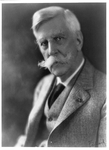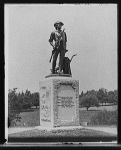Posted on January
18, 2016
Obama Seconds Holmes
Our rights don’t just end somewhere
by
Daniel
Clark
A guest on The
Steve Allen Show once said, “I don’t believe in vitamins,” to which Allen
replied, “But I’ve seen them.” This is basically
what President Obama means when he declares, “I believe in the Second
Amendment.” What he’s really saying is
that he is aware of its existence, not that he agrees with it, or believes in
the reasons it was written and ratified.
Many conservatives are relieved that Obama’s recent
executive orders on gun control were relatively unambitious. While announcing them, however, he revealed
just the sort of willingness to revoke our Second Amendment rights that many
Americans fear. “I mean, think about it,”
he said. “We all believe in the First
Amendment, the guarantee of free speech, but we all accept that you can’t yell
‘fire’ in a theater."
 That
statement is a reference to Oliver Wendell Holmes’ majority opinion in the
unanimously but wrongly decided Schenck v. United
States case. The petitioner, Charles
Schenck, was a Socialist Party leader who had been
found in violation of the Espionage Act, for his encouragement of draft-dodging
during the First World War. It would
have been only natural to wish there were some constitutional basis for ruling
against him, but none existed.
Undeterred, Justice Holmes simply made things up when he wrote, “the
most stringent protection of free speech would not protect a man falsely
shouting fire in a theater and causing a panic.”
That
statement is a reference to Oliver Wendell Holmes’ majority opinion in the
unanimously but wrongly decided Schenck v. United
States case. The petitioner, Charles
Schenck, was a Socialist Party leader who had been
found in violation of the Espionage Act, for his encouragement of draft-dodging
during the First World War. It would
have been only natural to wish there were some constitutional basis for ruling
against him, but none existed.
Undeterred, Justice Holmes simply made things up when he wrote, “the
most stringent protection of free speech would not protect a man falsely
shouting fire in a theater and causing a panic.”
It’s hard to know where to begin dissecting that
oozing heap of gobbledy. This hypothetical “most stringent protection
of free speech” most certainly would protect such a man, because if it didn’t,
it wouldn’t be the most stringent. The First
Amendment doesn’t go that far, though.
It only prohibits Congress from making a law abridging the freedom of
speech. If shouting “fire” in a theater
is illegal, that’s because it’s a violation of a state law or local
ordinance. No federal law, made by
Congress, is involved. Yet Holmes used
this irrelevant and deliberately imprecise parallel to justify the abridgment
of the freedom of speech, through a law that had been made by Congress.
What Holmes would have us believe is that the First
Amendment’s limitations are not written into that law itself, but instead are
left to be drawn arbitrarily by our superiors, whose role it is to stop us
before we take our freedoms too far. The
reason it can be illegal to shout “fire” in a theater is because it isn’t a
federal issue, not because some omnipotent figure is empowered to dictate the
boundaries of our rights. Holmes ruled,
with no constitutional support whatsoever, that if something you say presents a
“clear and present danger,” then Congress may indeed abridge your freedom of
speech.
 By
citing Holmes, Obama indicates that he views the Second Amendment the same
way. This is doubly sophistic, because
our Second Amendment rights can’t be curtailed by state and local authorities,
let alone Congress. Unlike the First
Amendment, which specifically restricts federal power, the Second states in
absolute terms that, “the right of the people to keep and bear arms shall not
be infringed.” What Obama, while
channeling Holmes, is saying is that our Second Amendment rights (in which he
believes, mind you) shall be infringed whenever he feels like there’s a really
good reason.
By
citing Holmes, Obama indicates that he views the Second Amendment the same
way. This is doubly sophistic, because
our Second Amendment rights can’t be curtailed by state and local authorities,
let alone Congress. Unlike the First
Amendment, which specifically restricts federal power, the Second states in
absolute terms that, “the right of the people to keep and bear arms shall not
be infringed.” What Obama, while
channeling Holmes, is saying is that our Second Amendment rights (in which he
believes, mind you) shall be infringed whenever he feels like there’s a really
good reason.
Holmes was willing to trample our rights in
overzealous pursuit of a genuinely vile character. Whom do you suppose Obama is seeking to thwart
when he says another constitutional right “we all believe in” may be just as
whimsically restricted? During a 2008
speech in San Francisco, he prejudicially smeared small-town Americans in
Pennsylvania and the Midwest by saying, “They get bitter. They cling to guns or religion, or antipathy
to people who aren’t like them.” What’s
one theater shouter compared to countless bitter, gun-wielding, religiously
motivated racists?
If Holmes successfully argued that words can cause a
“clear and present danger” that justifies the nullification of rights, then how
much easier is it to make the same argument about firearms? Do you keep a gun in a house where there are
children? Do you have a carry permit
that allows you to walk armed through crowded streets? Is there any possibility that someone might
break into your house, take your gun, and go on a rampage? Then you, too, may pose a clear and present
danger. Good thing we have constitutional
scholars with middle names like Wendell and Hussein, to decide where your
rights just happen to end all of a sudden.
The Shinbone: The
Frontier of the Free Press